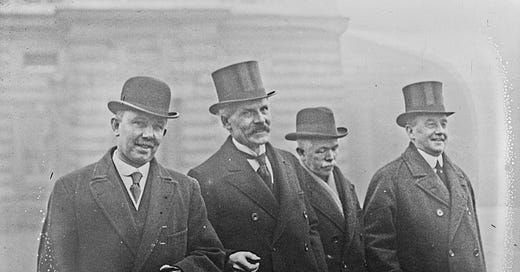Labour colonial secretary James Henry Thomas, prime minister Ramsay MacDonald, transport secretary John Robert Clynes and home secretary Arthur Henderson trying to look respectable in 1924. Bibliothèque nationale de France. Public Domain
Please support my journalism by signing up as a free or paying subscriber. Free subscribers have access to some pieces. Paying subscribers have access to everything, and more importantly allow me to carry on writing!
One hundred years ago a nervous George V, the great grandfather of our current king, swore in the UK’s first Labour government.
The Bolshevik revolution of 1917 had terrified his majesty. But after some wobbling the king accepted that Labour was not going to execute him, as Lenin and the communists had executed his cousin Tsar Nicholas II.
It was better to accept moderate British “socialism” and hope the concession would isolate the extremists.
“My grandfather [Prince Albert] would have hated it; my father [Edward VII] could hardly have tolerated it; but I marched with the times,” he is meant to have boasted.
Familiarity breeds ignorance as well as contempt. A century on, we can forget what an extraordinary institution the Labour party is. The United Kingdom had seen nothing like it.
The Conservatives and Liberals had roots going back to the 17th century. Each had aristocratic and plutocratic support. They were the establishment parties.
Labour had its roots in the trade unions, left-wing societies and Christian socialist movements of the late 19th century. Big business and the aristocracy could not abide it.
Labour’s early leaders were more likely to be Scottish than English, working than middle or upper class. In London today you can walk around the richest streets in the West End and find the gentlemen’s clubs the Georgians established for Tory politicians (such as the Carlton) or the Victorians built for Liberal politicians (such as the National Liberal Club)
But there are no gentlemen clubs for Labour politicians. They weren’t gentlemen then and most aren’t gentlemen now.
Ramsay McDonald, who became the first Labour prime minister, was the illegitimate son of a farmhand. Denounced to this day as a traitor (for reasons we will get to) he remains an extraordinary figure.
MacDonald opposed the First World War because of the suffering war imposed on the working class. Vilified in the jingo press, expelled by his golf club in his native Scotland, he lost his seat in Parliament at the war’s end in 1918.
And yet MacDonald was prime minister by 1924. At the risk of sounding like a sentimentalist, the fact that a conscientious objector could go to Downing Street tells you something good about this country.
Of that first Labour government, Arthur Henderson, the Home Secretary, began his working life in a Glasgow iron foundry. “Jimmy” Thomas, the Colonial Secretary was a railway worker, Willie Adamson, the Scottish Secretary was a Fife coal miner.
The 1920s are truly history now. It is not just that no one alive can remember them. Most people will not have had parents who told them about life in the aftermath of the First World War either.
Stalin, appeasement and the rise of Hitler ensures that the 1930s are still with us. But the 1920s are gone.
Or so it appears.
They deserve to be remembered because the problems that confronted the first Labour government will confront the next Labour government when Keir Starmer takes power.
What to do about the moribund political system? How can a party of outsiders can stop itself falling victim to imposter syndrome? These are perennial issues for Labour.
For in the 2020s as in the 1920s, the British progressive movement needs to ask how to keep the Conservatives out of power.
After 100 years, progressives still do not have a good answer.
The collapse of the old Liberal party remains one of British history’s most controversial subjects for precisely this reason.
Under the first-past-the-post system the anti-conservative vote needs to maximise itself by uniting behind one party. (If you want to stop Donald Trump you will not, for instance, advocate breaking up the Democrats into rival parties).
In 1906 the Liberals won a landslide victory in part by making what we would now call a “progressive alliance” with the newly formed Labour party. (The Liberals stood aside to allow Labour to win 29 seats).
By the 1920s, Labour and the Liberals were rivals fighting each other and splitting the anti-Tory vote.
Keep reading with a 7-day free trial
Subscribe to Writing from London to keep reading this post and get 7 days of free access to the full post archives.




